Upfront Conclusion
The best project management software for churches right now is Monday.com and ClickUp
Running a church is just like running any other enterprise.
There are facilities to maintain, staff to pay, community events to plan, and so on.
Some churches run small-scale marketing or advertising campaigns.
On top of these business obligations, church leaders must also plan sermons, services, weddings, and other functions that occur within the boundaries of the church.
Such a complicated venture requires a lot of planning, coordination, and collaboration between different parties.
The pastor or priest must run the religious and often the secular affairs of the church, sometimes in coordination with a church council or a larger religious body such as the Catholic church.
Stakeholders from within the church must be looped into decision-making, and events such as community meetings, weddings, or funerals require coordination with outside personnel.
The variety of undertakings that a church facilitates means that pastors and church leaders are often stuck dealing with complex situations without adequate technological tools to help them manage their time, facilities, staff, and most importantly, their flock.
How can technology help to improve the operations of churches and make life simpler for all involved?
The answer to this is project management software.
Project management software combines multiple functions into one software platform, meaning you can meet multiple needs through one application instead of needing to jump between various software tools.
Project management software generally includes features like:
- Communications – email, chat boards, messaging, or forums.
- Document sharing.
- Task management – assigning tasks, scheduling, subtasks, planning, and organization.
- Time tracking – who worked on what, when, for how long, and at what rate.
Project management software is built around collaboration and sharing, which are essential to the smooth operation of any enterprise, including churches.
There are many available project management software tools on the market, which can make it challenging to choose which suite will work best for you.
We will consider price, features, and ease of use to help you choose the best project management software for your church.
- Project Management Software For Large Companies
- The Best G-SuiteProject Management Software
- Project Management Software with File Transfer
- Project Management Software with File Transfer
- Project Management Software For Scrum
- Project Management Software with Client Portal
- Project Management Software with Budgeting
- Project Management Software With Outlook Integration
- Project Management Software with No Annual Fees
- Project Management Software with Recurring Tasks
- Project Management Software with Calendar
- Used Project Management Software
- EnterpriseProject Management Software
- Collaborative Project Management Software
- Simple And Easy To UseProject Management Software
- Clickup vs Microsoft Project
- Clickup vs Teamwork
- Monday.com vs Microsoft Project
- Monday.com vs Scoro
- Monday.com VS Github
- ClickUp vs. Dubsado
- Monday.com vs. Meistertask
- ClickUp vs. Airtable
- Clickup vs Microsoft Project
- ClickUp Vs. Todoist
- Clickup vs Notion
- Monday.com Vs. Trello
- ClickUp Vs. Trello
- Monday.com vs Airtable
- Monday.com vs Asana
- What Is Project Management Software?
- Is it Difficult to Use a Project Management Software Well?
- How To Use Project Management Software?
- How Much Does Project Management Software Increase Productivity?
- What is “Portfolio” in Project Management Software?
- What Are Some Unique Features of Project Management Software?
- What Is FreshWorks & What Does It Do?
- Can Asana Be Used For Personal Use?
- How Much Does Project Management Tools Cost?
- Who Invented Project Management Software?
- What to Look for in Project Management Software?
- What Does Workflow Management Software Do?
- What Are The Types Of Collaboration Software?
- When NOT to UseProject Management Software
- What is The Purpose of Project Management Software?
Why use Project Management Software for Churches?
Project management software can be a beneficial tool for churches because it allows for efficient resource management, collaboration, accountability, task automation, and proper planning.
Churches can streamline processes, assign tasks and resources, and track progress to make sure that projects are finished on time and under budget by utilizing project management software.
It can also assist churches in better planning and organizing events, freeing up time for more crucial responsibilities like outreach and volunteer work.
Churches can provide better services to their congregants and communities and reduce the stress and difficulties associated with managing several projects and events by utilizing project management software.
Tip: monday.com is a great tool for churches to manage their operations, events, and community outreach efforts.
What makes good Project Management Software for Churches?
Good project management software for churches should have features such as:
- Communication tools
- Task and project tracking
- Resource management
- Reporting and analytics
- Mobile accessibility
- Scheduling and calendar management
- Security and data privacy.
Because church personnel and volunteers may lack substantial technical knowledge, the program should be simple and easy to use.
Also, the software needs to be mobile-friendly so that volunteers may use their smartphones or tablets to access it.
Good project management software for churches should be simple to use, intuitive, and adaptable to the particular requirements of the church.
The software must enable church officials and volunteers to successfully collaborate and handle their projects, events, and resources.
Tip: ClickUp allows you to manage your church’s volunteer program, and create a project to track volunteer tasks, schedules, and hours.
How to choose the right Project Management Software for Churches
To choose the right project management software for churches, analyze the church’s specific needs, investigate available solutions, consider budget, evaluate user-friendliness, look for customization and integration options, and evaluate customer support.
Features like task and project tracking, communication tools, resource management, scheduling and calendar management, reporting and analytics, mobile accessibility, security, and data privacy are all essential in project management software for churches.
By using these guide, churches can choose the project management software that best suits their requirements and aids in the accomplishment of their mission and ministry objectives.
Tip: monday.com allows churches to create a board to plan events, assign tasks to team members, track progress, and set reminders.
Best Project Management Software for Churches
1. Monday.com
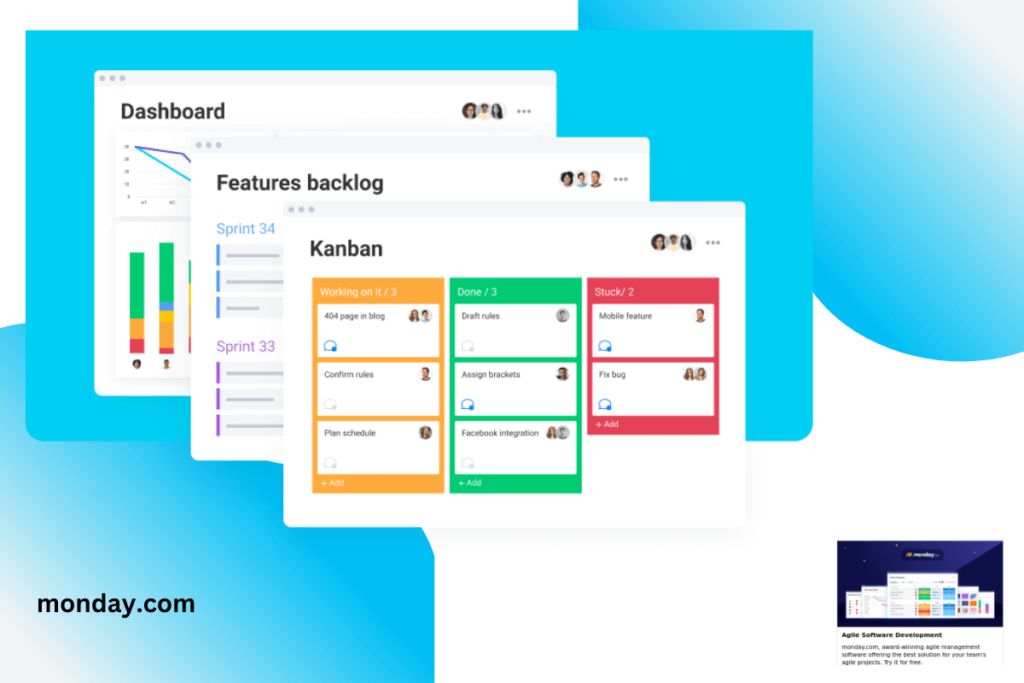
Monday.com is not just a cloud-based church project management software that comes with an option for on-premise deployment.
Monday.com is a popular project management tool that provides its users with multiple ways to view project campaigns.
Features
Effective project collaborations by allowing team communication simply by adding messages to tasks.
The timeline planning feature allows its users to plan timelines across various stages of a project and track the project’s progress using a dashboard.
Project templates allow its users to customize their project workflow templates which can be replicated later for similar projects.
A time tracking feature that helps in tracking the time spent on a project by each member.
The information obtained is later used in billing the client.
A file management feature that allows users to add images, files as well as other multimedia files to their tasks.
Users are also allowed to search for documents using this feature.
Price
Free – up to 2 members (limited functionality); Basic – $8 per member/month; Standard – $10 per member/month; Pro – $16 per member/month.
Ease of Use
When it comes to facilitating collaboration across church departments, Monday.com is a really useful tool.
The project management software provides a place to store all church files so everyone has on-demand access to them.
And it’s flexible: you can view projects in a number of different ways, from kanban boards to Gantt charts to good old-fashioned spreadsheets.
There are use cases for virtually any department including project management, HR, tech support, sales, or creative teams.
2. ClickUp
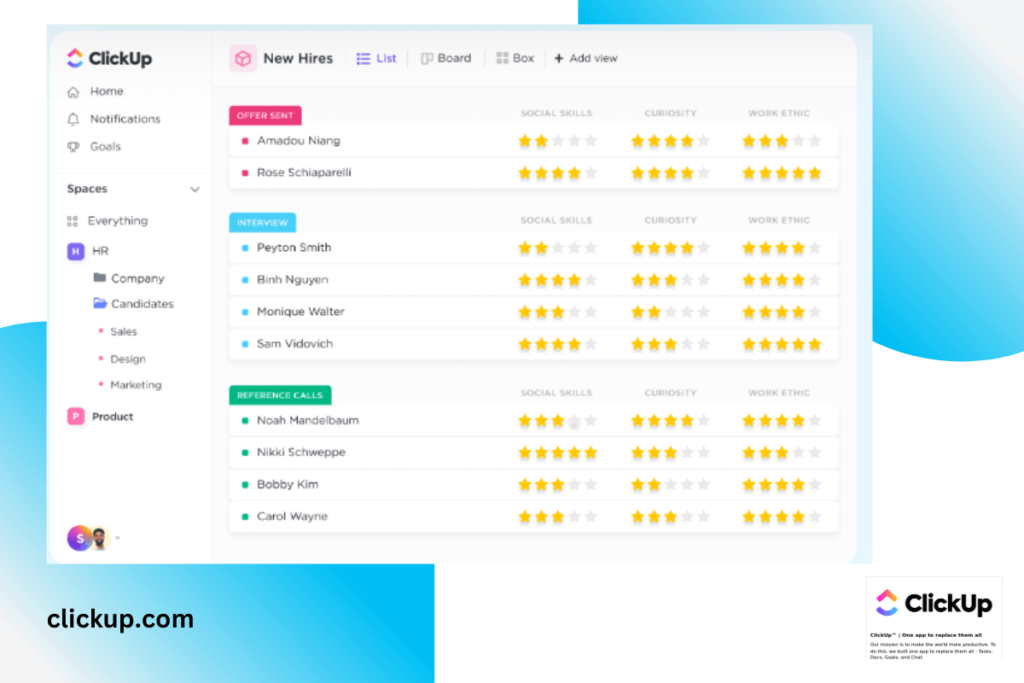
A comprehensive project management solution, ClickUp is focused on improving your workflow and efficiency.
With a feature set that includes well-developed task and process management tools, detailed reporting, time management, and collaboration features, ClickUp offers users a comprehensive suite of technologies for managing the day-to-day operations of any church.
Features
Process management tools in ClickUp will help you organize the workflow of your church.
With customizable project and task statuses, checklist templates, task dependencies, and the ability to assign multiple people to single tasks.
ClickUp allows users to maintain detailed control over their work processes.
Tasks can be set up to recur, handy for those weekly sermons, holidays, and other occasions that happen on a frequent or predictable basis.
Users can also create favorite views, allowing them to easily access the most pertinent information for their specific needs.
Tasks support @ mentions, so your team can chat in a task and keep the relevant information contained in its specific place.
Price
ClickUp offers a Free Forever plan, which grants users access to unlimited tasks, unlimited members, and up to 100MB of storage.
Churches who have broader needs than this can upgrade to an Unlimited plan for $5 per user per month; this unlocks unlimited app integrations, unlimited project dashboards, the ability to add guests and manage permissions, and advanced customizability.
Ease of Use
ClickUp is simple to use. The signup process helps you through the initial setup and configuration of the application.
A tutorial is available to aid you in setting up your first project and to help familiarize you with the workspace of the application.
For a very full-featured project management tool, ClickUp has good initial user support and is relatively simple to use.
3. Google Workspace
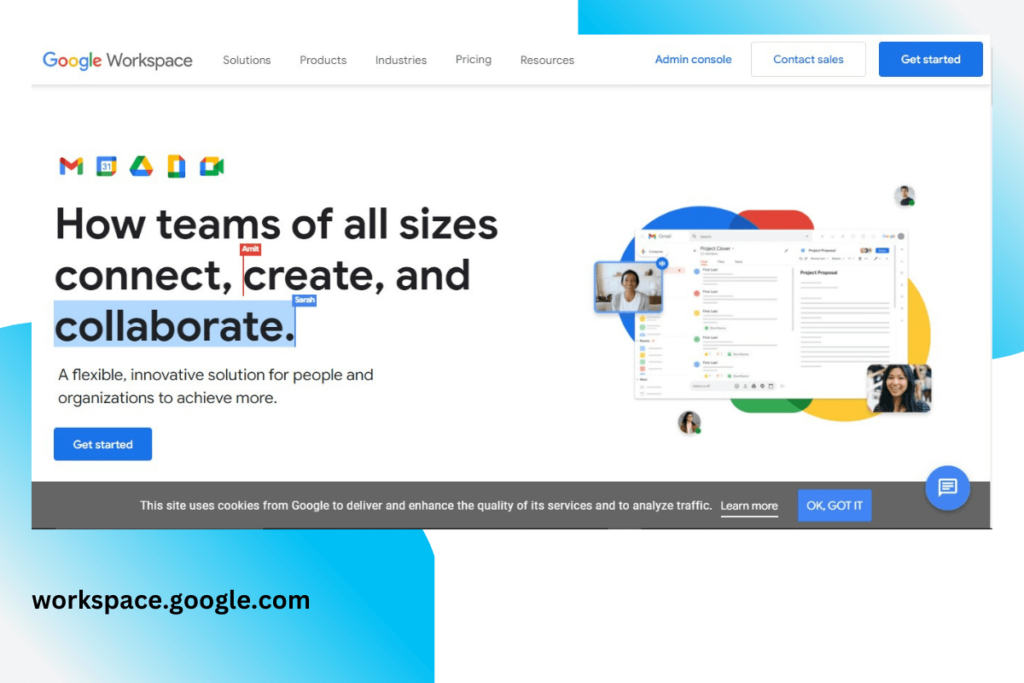
Google Workspace is not a project management application per see.
However, the popular appeal, wide base of people already using Google products, simplicity of this tool, and ease of collaboration make this a highly valuable tool for churches in need of collaboration and project management software.
Features
Google Workspace, formerly G-Suite, is a cloud-based collaboration system that includes access to features like email, messaging, document sharing and storage, word processing, spreadsheets, presentations, and more.
One of the reasons that Google Workspace is at the top of our list is that many of your parishioners, church elders, employees, and community partners are likely already using Gmail, and with Gmail comes access to basic Workspace tools for free.
Users of Workspace can share, comment on, mark up, and edit documents.
Permission levels for other users can be set by the document owner in the sharing menu, so you can grant appropriate permissions to your team based on their roles.
Documents include everything from written documents to spreadsheets and presentations.
Calendar, Chat, Meet, and Mail functions within Workspace allow your team to collaborate with ease.
Price
Google’s Docs, Drive, Mail, and Calendar features are all free to use – all your team needs to do is create a Gmail account.
For larger churches needing access to secure email, video storage, or large amounts of cloud storage, Business, and Business Plus plans cost $12 and $18 per user per month, respectively.
Ease of Use
As one of the most popular software tools in the world, Google is familiar to almost everyone.
The features of Google Workspace can be utilized by even the least technically minded user, making this product broadly appealing to users of all sorts – and especially to budget-conscious churches.
4. LiquidPlanner
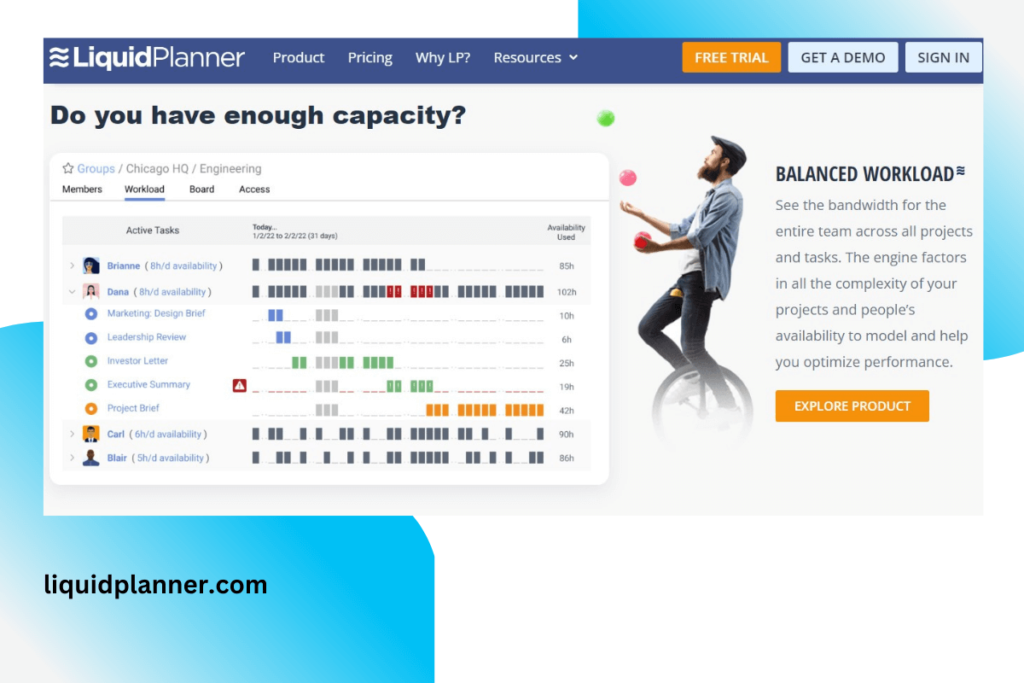
One of the premium products in the Project Management market is LiquidPlanner.
With a brand-new release coming soon, LiquidPlanner is actively being developed and enhanced to stay relevant to users’ needs – a good sign for those considering doing business with LiquidPlanner.
Features
LiquidPlanner defaults to a Gantt chart view.
For those not familiar with the Gantt chart, it is a way of displaying task information in a flow chart that makes it easy to visually understand where a project is, where it came from, and where it is going.
Tasks are highly customizable, and users can add almost any field to a task to help keep them organized.
Users can also create project milestones, helping you keep an eye on progress as your various projects and business needs evolve.
One drawback of tasks in LiquidPlanner is that there is no easy way to generate subtasks.
That said, users can insert checklists into tasks to help them visualize progress.
Task dependencies are easy to generate to help you manage more complex projects or events.
If your church is larger and has a staff, LiquidPlanner’s resource management tools help you keep track of who is where doing what, and when.
Scheduling can be interfaced with LiquidPlanner to avoid scheduling someone for a task when they are unavailable.
LiquidPlanner can also handle pop-up tasks – for example, a parishioner has become ill, and the church is raising funds and holding prayer meetings.
Rather than creating a specific project for this one instance, users can create an ad-hoc task and assign it to someone.
If this sounds like a perfect job for the junior pastor, you can easily assign it to them.
Price
LiquidPlanner costs $35/user/month.
There is no free version available.
That said, LiquidPlanner’s full host of features and capabilities make it worth the investment.
Ease of Use
LiquidPlanner is a very feature-rich program, and as such, it is recommended that you begin by watching a few of their video tutorials to understand how best to make use of this product.
While it can be a complicated program, it can also serve as a single application to help you manage your church and your church’s affairs.
LiquidPlanner is world-class and well worth investigating if your church is large or has particularly complex needs.
5. Trello
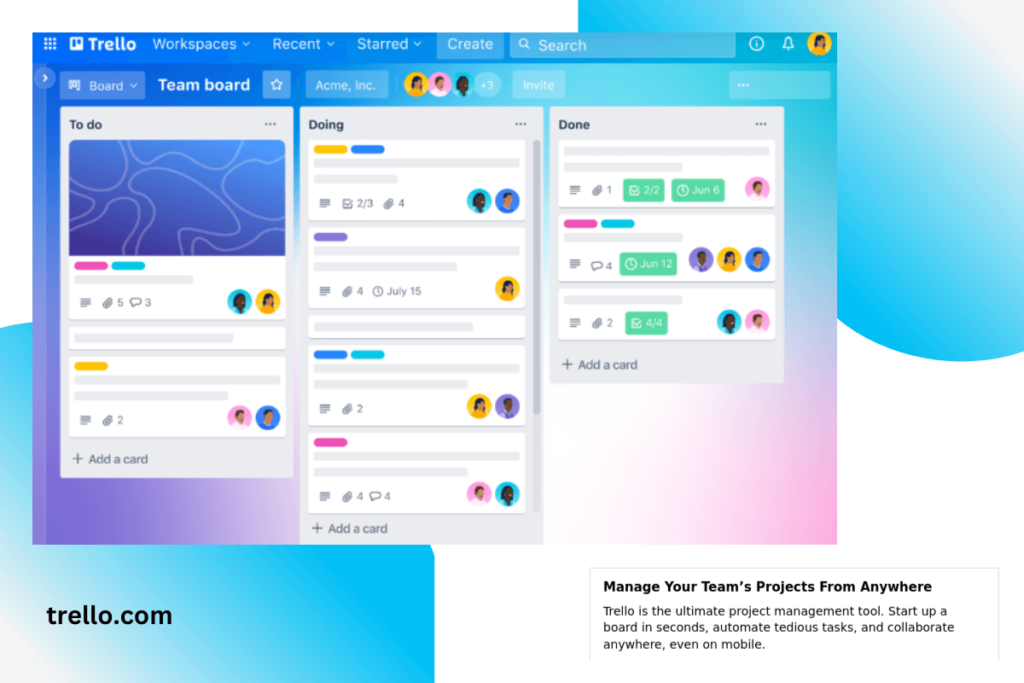
If LiquidPlanner sounds like it might be a little too much work for your needs, you may wish to consider a more lightweight project management tool.
Trello is an excellent project management tool that keeps the interface simple and has a generously equipped free version.
Features
Trello separates projects into boards and cards.
Boards represent the overall project or function you are managing.
In a church environment, you may be managing a food drive, a wedding, four weekly sermons, a Sunday school, and a substance use support group.
In Trello, each of these discrete functions is given its own board.
Cards are then assigned to each board.
A card represents a specific task or module.
You might make a card for “Sunday Sermon” on your Sermon board, or a card for “Contact local food bank” on your Food Drive board.
Cards are the lifeblood of Trello: they can be enhanced with checklists, assigned to individual users, and dragged/dropped into different columns to represent their status.
Cards also feature comment threads and can be marked with due dates or customized labels to keep your workload in order.
Power-ups can be leveraged to enhance the functionality of Trello, and come in a variety of flavors that offer enhanced task management, integrations, and other advanced features.
Price
Trello’s free version is rather hearty software. Users can enjoy the following:
- Up to 10 boards
- Unlimited cards and members
- Unlimited storage (10 MB/file)
- Task assigning and due date features
- iOS and Android mobile applications
- 2-factor authentication for security
- One power-up per board
Trello Business Class includes the above, plus:
- Unlimited boards
- Unlimited power-ups
- Advanced checklists
- Admin features and more.
Business Class costs $10 per user per month.
That said, the free version is likely suitable for your church’s needs.
Ease of Use
Trello has a reputation as a very light, intuitive, and easy-to-use project management tool.
Users can log in through a desktop interface, or they can download the iOS or Android applications to utilize Trello on their mobile devices.
The straightforwardness of Trello is displayed in the drag-and-drop interface, simple task management, and easy navigation.
For small churches, churches on a budget, or churches who wish to keep their software suites simple, Trello is an excellent choice.
6. Airtable
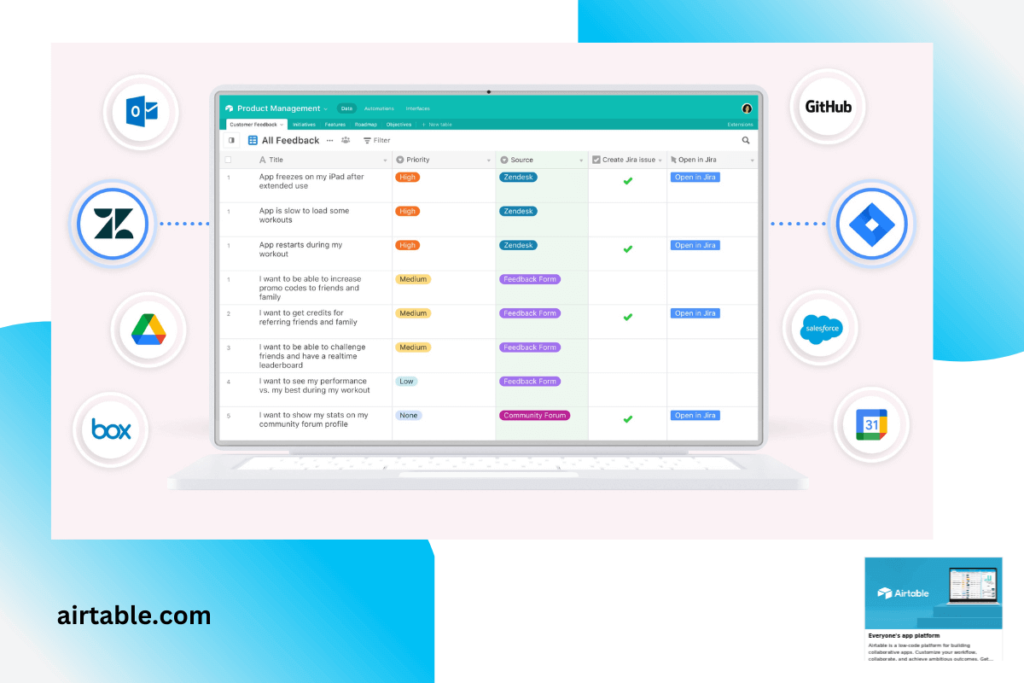
Airtable is a cloud-based collaboration tool that provides users with multiple viewpoint options to help you understand the status of your projects and your resources.
Users can select from a gallery-style view of pending tasks, a grid view, or a calendar view.
For business-minded church leaders, Airtable can also display tasks and projects in a Kanban-style view and in a Gantt chart.
Projects are coordinated from “bases,” which house all the relevant information about your project.
Features
Airbase’s multiple viewpoint options provide users with many choices pertaining to how to visualize their data and their tasks.
Collaboration tools are built to allow the owner of the base to provide specific permissions to other users – so you can grant the church secretary the power to alter schedules but give your deacons read-only or commenter access.
This enables you to control who can and cannot change various items in the base.
For users who need tools not included in Airtable, there is an Automation and App Marketplace.
The marketplace contains plug-ins that will enhance Airtable’s functionality and usefulness for you; for instance, if your team likes to use Slack to communicate, you can integrate Slack into Airtable and even use it in automation.
Airtable is also highly useful for database functions.
If you need to inventory church property or maintain parishioner lists, donor records, or other items, Airtable has a fairly intuitive databasing tool that will allow you to keep track of your church’s assets.
Price
Airtable has a free version that provides access to:
- Unlimited bases (projects)
- 1,200 records per base
- 2GB storage per base
- 100 automation per month
- Web, desktop, Android, and iOS applications
- Real-time collaboration
Users who need more storage, more records, or more automation can pay for the Plus version at $10 per user per month; or the Pro version at $20 per user per month.
Ease of Use
With a simple user interface and a good library of resources and training tools, Airtable is simple to use.
It is also flexible enough to work in the place of multiple applications, freeing you from the digital chaos that can entangle us.
The market for project management software for churches is quite competitive.
There is a plethora of software available to churches and church leaders, and there is a lot of information to consider when it comes time to decide which product is right for your needs.
This decision can certainly be challenging, but hopefully, the explanations here have helped you understand what project management software is and how it can help your church organization function more smoothly.
Technology can be intimidating, but churches can find creative ways to leverage project management software into more efficient operations and more satisfied parishioners and community partners.
RELATED: Project Management Tools Best For Startups | Agile Project Management Systems | Top Project Management Tools For Small Teams
